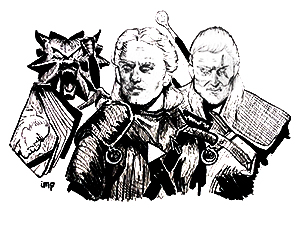“The Witcher” proves not all adaptations are bad
March 5, 2020
Despite the amount of streaming services we have at our disposal, it can be hard to avoid one controversial topic: book to screen adaptations.
Every adaptation of a classic is held to an incredibly high standard, and no matter its success, inevitably you hear the same old turn of phrase from an annoyed fan: “the books are always better than the movies.”

And that may be the case, but I’m still Team Adaptation. From a production standpoint, adaptations are really smart.
Making movies about a popular book guarantees a preexisting audience, which is assuring to producers about to drop millions of dollars on a film.
But take it from me, someone who’s seen my favorite franchises crash and burn on Rotten Tomatoes, there is an inherent worth to screen adaptations. For me, Netflix’s “The Witcher” proves this point.
Released in December 2019, “The Witcher” follows the stories of Geralt, a for-hire monster hunter, Yennefer, a powerful sorceress and Ciri, a young princess forced out of her home following a brutal attack on her kingdom.
The show is an adaptation of the fantasy novels by Polish author Andrzej Sapkowski, a series that reached a new level of global popularity thanks to a series of video games.
Already, there was a risk in making a show based on both a book and a video game series. The only adaptations held to a more critical standard than ones of books are those of video games. Mostly because every video game movie in recent memory has been god awful.
After “The Witcher’s” release, reviews were a little mixed — the show’s attempt to blend three different timelines was lost on many viewers.
However, some fans seemed pleased with the action-packed, eight-episode fantasy romp.
I loved it for quite a few reasons. The acting was amazing, as Henry Cavill fits right in as the rough around the edges protagonist, and Johdi May’s performance of Queen Calanthe was equal parts badass and emotionally engaging.
The overall arc and pacing of the story was interesting and kept me engaged. I still have the soundtrack on loop.
The show works under the assumption that you are bright enough to keep up with it. Sometimes it was wrong, but I’m happy it assumed the best of me.
I did find myself googling “explain Witcher episode _____” a few times.
What interested me most about “The Witcher” wasn’t the show itself, but the events following its release.
Nearly five years after the original release of “The Witcher 3: Wild Hunt” in May 2015, the game has reached a new active player record of over 100,000 people playing concurrently on Steam, according to a Dec. 29 article from Kotaku.
The player count after the game’s release maxed out at 92,000 players, according to a Dec 29. PC Gamer article.
This phenomenon fascinates me for a couple reasons because it demonstrates the worth that modern adaptations can have.
For one, adaptations can remind us why we love our old favorite books or games. All of the nostalgia and love we have for a series come rushing back — the fact that so many people went back to “The Witcher” games is proof of that.
Secondly, it draws in a new crowd of fans who have the chance to live the excitement we lived when we first picked up the book or game.
It’s not always easy to see the stories we grew up with fleshed out for the big screen. The actors may not look like how you envisioned the characters, they may glaze over scenes you loved, or just change the plot around like crazy. Believe me, I was a Percy Jackson fan.
In the case in defense of book to screen adaptations, I think “The Witcher” is proof that it is possible for adaptations to accomplish two things: satisfy current fans with new retellings of their favorite stories, and draw in new fans, introducing them to potentially their next favorite series.






